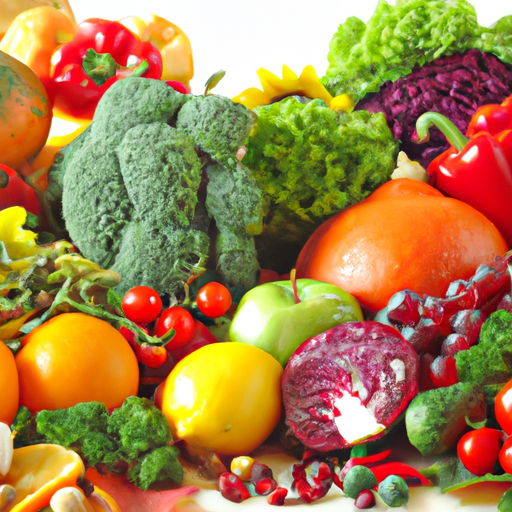Have you ever wondered what the health benefits of a vegetarian diet are? Well, you’ve come to the right place! A vegetarian diet has been gaining popularity in recent years, and for good reason. Not only does it have the potential to improve your overall health, but it also has environmental and ethical benefits as well. In this article, we’ll explore the various health benefits of a vegetarian diet and how it can positively impact your life. So, sit back and get ready to learn more!
One of the main health benefits of a vegetarian diet is its ability to reduce the risk of chronic diseases such as heart disease, high blood pressure, and diabetes. By eliminating or reducing the intake of meat and animal products, you can lower your cholesterol levels, improve blood sugar control, and maintain a healthy weight. Additionally, a vegetarian diet is often rich in fruits, vegetables, whole grains, and legumes, which are packed with essential vitamins, minerals, and antioxidants that promote overall well-being.
Furthermore, adopting a vegetarian diet can also lead to weight loss and weight management. Plant-based foods tend to be lower in calories and higher in fiber, which can help you feel fuller for longer and prevent overeating. In fact, studies have shown that vegetarians tend to have a lower body mass index (BMI) than non-vegetarians. So, if you’re looking to shed a few pounds or maintain a healthy weight, a vegetarian diet can be a great option for you.
In addition to physical health benefits, a vegetarian diet can also have a positive impact on your mental well-being. Research suggests that vegetarians may have a lower risk of depression and anxiety compared to non-vegetarians. This could be due to the higher intake of antioxidants, vitamins, and minerals found in plant-based foods, which are known to support brain health. So, if you’re looking to improve both your physical and mental health, incorporating more plant-based meals into your diet may be worth considering.
In conclusion, a vegetarian diet offers a multitude of health benefits, including reduced risk of chronic diseases, weight management, and improved mental well-being. By choosing to include more plant-based foods in your diet, you can nourish your body with essential nutrients and enjoy the numerous benefits that come with it. So, whether you’re already a vegetarian or thinking of transitioning to a vegetarian diet, stay tuned for our upcoming article where we dive deeper into tips for a successful and balanced vegetarian lifestyle.
Reduced risk of chronic diseases
Lower risk of heart disease
A vegetarian diet can significantly reduce the risk of heart disease. Animal products, such as red meat and full-fat dairy, are high in saturated fats and cholesterol, which can contribute to the development of heart disease. By avoiding these foods and opting for plant-based alternatives, you can lower your intake of unhealthy fats and reduce the risk of heart problems.
Reduced risk of high blood pressure
High blood pressure, or hypertension, is a major risk factor for heart disease, stroke, and other cardiovascular conditions. A vegetarian diet, especially one that is rich in fruits, vegetables, and whole grains, is naturally low in sodium and high in potassium, which can help regulate blood pressure. By following a vegetarian diet, you can significantly reduce your risk of developing high blood pressure and its associated complications.
Decreased risk of certain cancers
Studies have shown that a vegetarian diet can decrease the risk of certain types of cancer, including colon, breast, and prostate cancer. Plant-based foods are typically high in antioxidants, fiber, and phytochemicals, which have been shown to have anti-cancer properties. Additionally, a vegetarian diet often includes a higher intake of fruits, vegetables, and whole grains, which are known to have protective effects against cancer development.
Weight management
Effective for weight loss
If you are looking to shed a few extra pounds, a vegetarian diet can be an effective tool for weight loss. By eliminating high-calorie and fatty animal products, you can reduce your overall calorie intake and promote weight loss. Additionally, plant-based foods are typically low in fat and high in fiber, which can help you feel fuller for longer and reduce cravings.
Helps maintain a healthy weight
Even if you are not looking to lose weight, a vegetarian diet can help you maintain a healthy weight. Plant-based foods are generally lower in calories and higher in nutrients compared to animal products. By filling your plate with fruits, vegetables, whole grains, and plant-based proteins, you can ensure that you are getting a wide range of essential nutrients while keeping your calorie intake in check.

Improved digestion
Higher fiber intake
A vegetarian diet is naturally high in fiber, which is essential for a healthy digestive system. Fiber promotes regular bowel movements, prevents constipation, and helps maintain a healthy gut. By opting for whole grains, legumes, fruits, and vegetables, you can increase your fiber intake and support a healthy digestive system.
Less risk of constipation
Constipation is a common digestive issue that can cause discomfort and bloating. A vegetarian diet, particularly one that is rich in fiber, can help prevent constipation by promoting regular bowel movements. Plant-based foods, such as whole grains, fruits, and vegetables, contain insoluble fiber that adds bulk to stools and helps them move through the digestive tract more easily.
Promotes healthy gut bacteria
A healthy gut microbiome is essential for overall well-being, as it plays a crucial role in digestion, nutrient absorption, and immune function. A vegetarian diet, especially one that includes a variety of fruits, vegetables, and whole grains, can promote the growth of beneficial gut bacteria. These bacteria help break down fiber and produce short-chain fatty acids, which have anti-inflammatory effects and support gut health.
Lower cholesterol levels
Decreased levels of LDL cholesterol
High levels of LDL cholesterol, often referred to as “bad” cholesterol, can increase the risk of heart disease and stroke. Animal products, such as red meat and full-fat dairy, contain high amounts of saturated fats, which can raise LDL cholesterol levels. By following a vegetarian diet and avoiding these foods, you can significantly reduce your LDL cholesterol levels and improve your cardiovascular health.
Increased levels of HDL cholesterol
In addition to lowering LDL cholesterol, a vegetarian diet can also increase levels of HDL cholesterol, often referred to as “good” cholesterol. HDL cholesterol helps remove LDL cholesterol from the bloodstream, preventing it from building up in the arteries. Plant-based foods, such as nuts, seeds, and avocados, are rich in monounsaturated and polyunsaturated fats, which can increase HDL cholesterol levels and further protect against heart disease.

Better blood sugar control
Reduced risk of type 2 diabetes
A vegetarian diet can lower the risk of developing type 2 diabetes, a chronic condition characterized by high blood sugar levels. Plant-based foods are typically low in saturated fats and high in fiber, both of which can improve insulin sensitivity and blood sugar control. By following a vegetarian diet, you can reduce your risk of developing type 2 diabetes and better manage your blood sugar levels.
Improved blood sugar regulation
Even if you have already been diagnosed with diabetes, a vegetarian diet can help improve blood sugar regulation and control. Plant-based foods, such as whole grains, legumes, and non-starchy vegetables, have a lower glycemic index, meaning they cause a slower and steadier rise in blood sugar levels. By incorporating these foods into your meals, you can help stabilize your blood sugar levels and reduce the need for insulin or other diabetic medications.
Improved nutrient intake
Higher intake of vitamins and minerals
A well-planned vegetarian diet can provide all the essential vitamins and minerals your body needs for optimal health. Plant-based foods are rich sources of vitamins, such as vitamin C, vitamin A, and folate, as well as minerals like iron, zinc, and calcium. By consuming a variety of fruits, vegetables, whole grains, and plant-based proteins, you can ensure that you are meeting your daily nutrient requirements.
Rich in antioxidants
Antioxidants are compounds that help protect your cells against damage caused by free radicals, unstable molecules that can contribute to chronic diseases and aging. Plant-based foods are naturally rich in antioxidants, including vitamins C and E, beta-carotene, and various phytochemicals. By incorporating a wide range of colorful fruits and vegetables into your diet, you can boost your antioxidant intake and support overall health.
Increased consumption of plant-based proteins
Contrary to popular belief, a vegetarian diet can provide an adequate amount of protein without the need for meat. Plant-based proteins, such as beans, lentils, tofu, tempeh, and quinoa, are excellent sources of protein and can easily fulfill your daily protein needs. By including these foods in your meals, you can promote muscle growth and repair, support immune function, and maintain overall health.

Reduced inflammation
Decreased levels of inflammatory markers
Chronic inflammation is a contributing factor to many diseases, including heart disease, diabetes, and arthritis. A vegetarian diet, particularly one that is rich in fruits, vegetables, legumes, and whole grains, can help reduce inflammation in the body. Plant-based foods are packed with anti-inflammatory compounds, such as antioxidants and phytochemicals, which can lower levels of inflammatory markers and promote overall well-being.
Lower risk of chronic inflammation-related conditions
By reducing inflammation in the body, a vegetarian diet can lower the risk of developing chronic inflammation-related conditions. Rheumatoid arthritis, inflammatory bowel disease, and certain types of cancer are all associated with chronic inflammation. By choosing a vegetarian lifestyle, you can decrease your risk of developing these conditions and improve your long-term health outcomes.
Lower environmental impact
Reduced greenhouse gas emissions
Animal agriculture is a significant contributor to greenhouse gas emissions, which are a major driver of climate change. By opting for a vegetarian diet, you can significantly reduce your carbon footprint and help mitigate climate change. Plant-based foods require fewer resources, such as water and land, to produce compared to animal products, making them a more environmentally sustainable choice.
Conservation of water resources
Animal agriculture is also a leading cause of water pollution and depletion. Livestock farming requires vast amounts of water for irrigation, feed crops, and animal drinking, contributing to water scarcity in many regions. By adopting a vegetarian diet, you can conserve water resources and help ensure their availability for future generations.
Preservation of biodiversity
The expansion of animal agriculture has led to deforestation and habitat destruction, resulting in the loss of biodiversity. By choosing a vegetarian diet, you can help preserve natural habitats and protect endangered species. Plant-based foods have a lower environmental impact and can contribute to the conservation of biodiversity.

Ethical considerations
Animal welfare and cruelty-free choices
One of the main reasons people choose a vegetarian lifestyle is due to ethical concerns regarding animal welfare. By opting for a vegetarian diet, you are actively choosing not to support industries that exploit and harm animals. Plant-based diets provide a compassionate alternative that promotes the well-being of animals.
Supporting sustainable and ethical food production
Adopting a vegetarian diet allows you to support sustainable and ethical food production practices. Animal agriculture is often associated with factory farming, which involves crowded and unsanitary conditions for animals, as well as the routine use of antibiotics and hormones. By choosing plant-based foods, you can support sustainable agriculture methods that prioritize environmental and animal welfare considerations.
Conclusion
In conclusion, a vegetarian diet offers numerous health benefits and positively impacts the environment and animal welfare. By following a vegetarian diet, you can reduce the risk of chronic diseases, manage your weight effectively, improve digestion, lower cholesterol levels, control blood sugar, enhance nutrient intake, reduce inflammation, lower your environmental impact, and support ethical considerations. It is a sustainable and ethical choice that promotes overall well-being. So why not give it a try and experience the numerous health benefits of a vegetarian lifestyle? Your body, the planet, and the animals will thank you.

